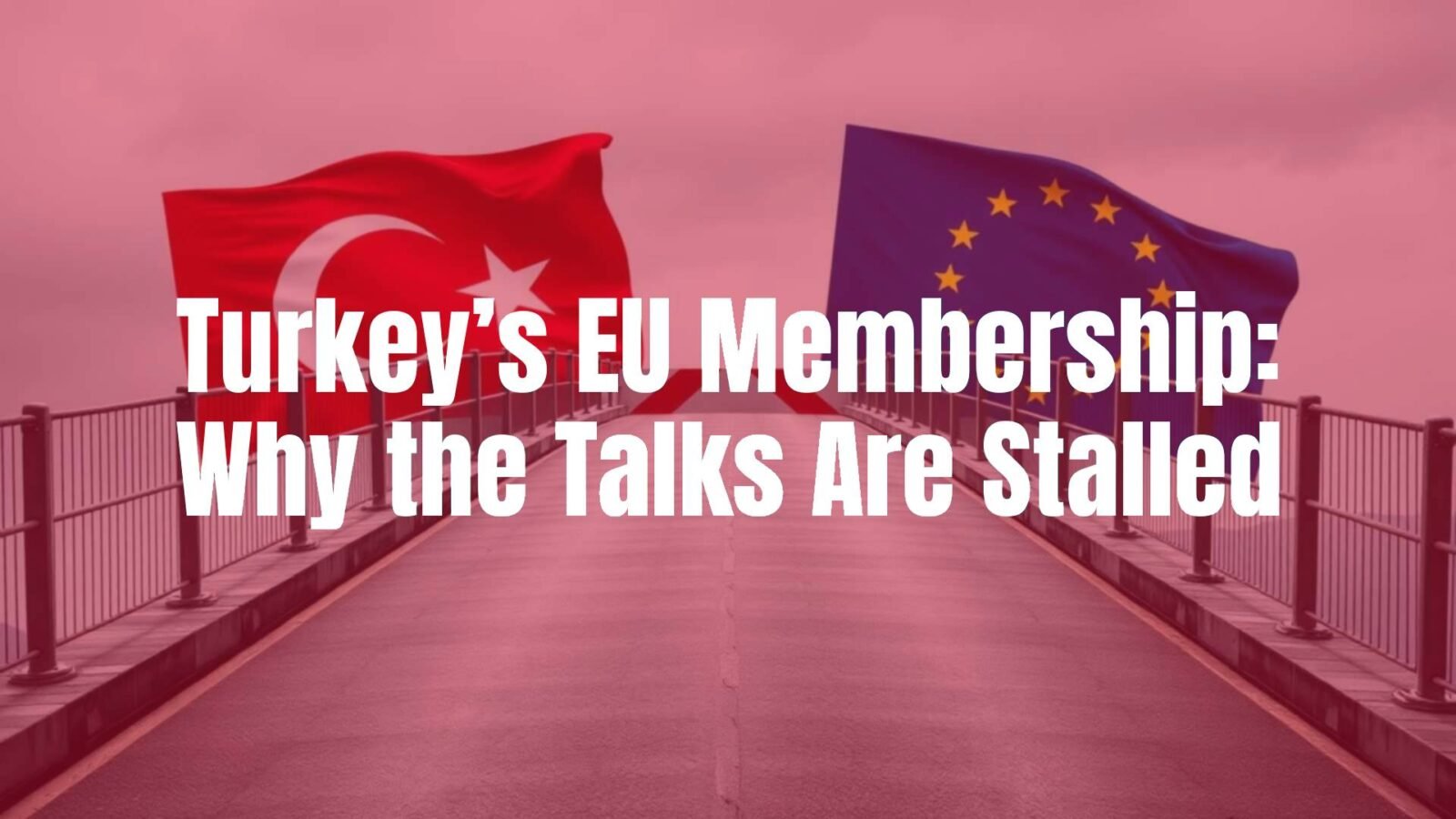Turkey’s attempt to join the European Union has been long and complicated, stretching over several decades with moments of optimism as well as disappointment. Right now, Turkey’s EU membership bid is on hold, mostly because of disagreements over human rights, politics, and disputes with EU countries. This article explains Turkey’s journey toward joining the EU, how the negotiations work, the main barriers, and what might happen in the future.
Since the founding of modern Turkey, closer connections to Europe have been an important national goal. But getting into the EU has turned out to be a difficult process, receiving heavy discussion and changing opinions both inside Turkey and across the EU.
What Is Turkey’s EU Membership Bid?
Turkey’s EU membership bid is its attempt to become a full member of the European Union. Becoming a member means Turkey would need to change its laws, politics, and economic system to match EU rules, which are called the acquis communautaire. The goal is to be part of the EU’s institutions and gain access to the benefits of its single market.
For Turkey, joining the EU is a key part of its plan to modernize and connect with the West, dating back to the days of Mustafa Kemal Atatürk. For the EU, Turkey’s entry would make the bloc larger and involve a country important for its location and influence, but also brings major concerns.
How Did Turkey Start Its Journey Toward the EU?
Turkey started looking towards Europe early in its modern history. After the fall of the Ottoman Empire and the start of the Turkish Republic in 1923, Atatürk led major changes to make the country more like European states, such as making the government secular and promoting industry. This set the groundwork for Turkey’s interest in joining European groups.
Turkey first tried to build a relationship with the European Economic Community (EEC) in 1959, applying for associate membership. This led to the 1963 Ankara Agreement, which aimed for eventual full membership and set up a plan for customs cooperation and free trade.

Important Dates in Turkey-EU Relations
- 1950: Turkey joins the Council of Europe as one of the first new members.
- 1959: Turkey applies to be an associate member of the EEC.
- 1963: Ankara Agreement signed, signalling Turkey’s membership goal.
- 1987: Turkey formally applies for full EEC membership.
- 1995: A Customs Union agreement is signed, strengthening economic links.
- 1999: The EU makes Turkey an official candidate for membership at the Helsinki summit.
- 2005: Negotiations for membership start in October.
- 2016: Talks are effectively stalled due to political and human rights concerns.
- 2019 & 2021: EU Parliament votes to suspend membership talks.
- 2025: EU Parliament votes again to keep talks frozen because of concerns over democracy in Turkey.
Timeline of Turkey-EU Talks
Turkey’s journey with the EU features a series of steps forward and many delays. Starting with early agreements, moving to full candidate status, and then hitting obstacles, the relationship has seen many ups and downs.
Main Milestones, 1950s-Now
Turkey’s connection to Europe goes back to the early days of European cooperation. After working with the Marshall Plan, joining the Council of Europe in 1950, and NATO in 1952, Turkey already saw itself as part of the West. The Ankara Agreement in 1963 aimed for closer trade ties and eventual full membership. Still, Turkey’s 1987 application for full EEC entry was postponed due to political and economic challenges, as well as disputes with Greece and Cyprus. The 1995 Customs Union brought stronger economic ties, and in 1999 Turkey became an official candidate country, opening formal talks in 2005-an event widely celebrated in Turkey.
Progress and Deadlocks
After negotiations began in 2005, some early successes included starting the screening process and opening a few negotiation chapters. One, Science and Research, was even temporarily closed in 2006. But momentum faded quickly. The Cyprus disagreement led the EU to freeze eight chapters by the end of 2006, and the situation dragged on as political frustrations rose. The 2016 refugee agreement between the EU and Turkey gave some hope for renewal, but it didn’t last. Since 2016, negotiations have made no progress. The EU blamed human rights problems and a return to authoritarian rule, especially after Turkey’s 2016 failed coup and the harsh government crackdown that followed. In 2019 and again in 2021 and 2025, parliament votes kept the talks on ice.

Negotiation Chapters and Progress
Each country joining the EU must work through a set of 35 topic areas called negotiation chapters. This system is tough and requires real changes in a country’s laws and systems.
What Are Negotiation Chapters?
The 35 negotiation chapters make up all the policy areas covered by EU law. Turkey must prove it can adopt, put into practice, and enforce these rules if it wants to join. These chapters cover everything from trade to human rights. The process starts with checking Turkish laws and then, chapter by chapter, Turkey must show its reforms match EU standards. These rules themselves cannot be changed-only how and when Turkey meets them is up for discussion.
Each chapter can involve major changes. For example, the chapter on law and basic rights means Turkey has to make real improvements in democracy and human rights, while the environmental chapter asks for stronger environmental laws. Because these chapters demand big changes, the whole process can take many years and depend on strong political will.
Status of Chapters: Open and Closed
| Status | Number of Chapters |
|---|---|
| Chapters opened | 16 |
| Provisionally closed | 1 |
| Chapters frozen | 17 |
| Remaining unopened | 18 |
Most chapters have not started or are frozen due to issues like the Cyprus conflict and concerns about law and rights. Only Science and Research was closed (and only provisionally) in 2006, showing just how little progress has been made since.
EU Pre-Accession Funding
The EU has given Turkey significant financial help through the Instrument for Pre-Accession Assistance (IPA), aiming to help Turkey reach EU standards. For 2014-2020, Turkey was allocated about €4.5 billion (€740 million a year). Still, as problems around democracy in Turkey have grown, some in the EU have questioned if these funds are being used well and have suggested giving more support directly to groups that push for democratic rights. In 2017, the EU’s auditors began checking if the money really helped improve democracy and rights in Turkey.
Main Problems Blocking Turkey’s EU Membership
Turkey’s membership process struggles with many serious problems, from politics and economics to culture and conflicts with neighbors.
Human Rights and Democracy Issues
Turkey has faced repeated criticism from the EU over its record on democracy and human rights, especially after the 2016 coup attempt led to wide arrests and limited basic freedoms. The EU has worried about the control of the courts, freedom of the press, and the arrest of opposition politicians. The view in Brussels is that Turkey is moving toward a more authoritarian style of government, and this blocks any progress on joining the EU.
Legal Issues and Minority/LGBT Rights
Certain Turkish laws have been a sticking point, especially Article 301, which makes it a crime to “insult” Turkey’s national identity and is seen as restricting free speech. Meanwhile, minorities-such as Kurds, Alevis, and Christians-often don’t have the same level of protection as in EU countries. While being gay is not a crime in Turkey, official bans on public LGBT events have raised worries. The EU says all these issues need fixing; better laws for women exist, but they aren’t always put into practice.

Economy and Trade
Turkey and the EU do lots of business together. The EU is Turkey’s biggest partner, and Turkey’s economy is strong, ranking high globally. Joining the EU would likely boost investment and trade even more. However, problems such as trade deficits and the need for Customs Union updates are hard to solve when talks aren’t moving forward.
Population and Demographics
Turkey has about 87 million people as of 2023-much younger on average than EU countries. If Turkey joined, it would be the EU’s most populous country, changing voting power in the European Parliament and raising concerns about large-scale migration to the rest of Europe.
Cyprus and Tensions with Greece
Cyprus remains one of the toughest obstacles. Turkey occupies the northern third of the island and does not recognize the government of the Republic of Cyprus, an EU member. Because of this, Turkey will not open its ports to Cypriot ships, which directly blocks membership talks. There are also ongoing disputes about maritime borders and drilling rights in the eastern Mediterranean with both Cyprus and Greece. Some EU countries, including Austria, Germany, and France, have also strongly opposed Turkish membership, suggesting a closer partnership rather than full entry.
Religion and Cultural Issues
As a mostly Muslim country, Turkey stands out from the mainly Christian EU and would be the first Muslim-majority member. Some inside the EU worry about cultural differences, while Turkish secularists hope membership would support Western-style freedom of religion. Debates remain heated over religious rights, state policies, and headscarf bans.
Armenian Genocide Recognition
Over the years, various European leaders have asked Turkey to recognize the 1915 events as genocide. Although the EU hasn’t made this a formal membership requirement, the issue comes up regularly. Turkey’s government strongly refuses to accept such recognition as a condition for joining.
Recent Changes Affecting Turkey-EU Relations
In recent years, several internal and external changes have pulled Turkey and the EU further apart, slowing or halting talks.
Democracy and Rule of Law
Since the failed coup in 2016, Turkey’s government has tightened its control over society, with the EU criticizing many measures as undemocratic. Mass job firings, arrests, and limits on free speech have led the EU to say that Turkey is getting further away from meeting EU standards for democracy and rights. In May 2025, the EU Parliament voted again to keep negotiations frozen because of these concerns.
Migration and Customs Union
Despite political differences, Turkey and the EU keep working together on some important issues. The 2016 deal over refugees means Turkey hosts millions of people fleeing Syria, with the EU providing money in return. This agreement has helped reduce the number of migrants arriving in the EU but remains controversial. Modernizing the Customs Union agreement would help both, but this plan is also stuck because of bigger problems.
Geopolitical Changes and High-Level Meetings
Turkey’s role as a regional power and NATO member keeps it important for the EU, especially during conflicts like Russia’s war on Ukraine. At summits, both sides try to maintain communication, but the lack of progress on major points means relations are still at a standstill.
What Would Happen If Turkey Joined the EU?
If Turkey became an EU member, this would bring big changes for both Turkey and the EU, both positive and challenging in terms of politics, the economy, and security.
Benefits for Turkey
- Economic: Access to the single EU market, more investments and financial support, and help in economic trouble.
- Political: Ongoing reforms pushed by the EU process, leading to more stability and stronger institutions.
- Mobility: Turkish citizens could live, work, and study anywhere in the EU.
- Security: Better security guarantees as part of a larger bloc, and a bigger role in European foreign policy.
Impacts on the EU
- Geopolitics: The EU’s border would stretch further, increasing its influence in the Middle East and Black Sea areas.
- Military: Turkey’s army and defense industry would add to EU strength.
- Demographics: The EU would gain a young population, but could also face challenges like adjustments in voting and budget rules.
- Integration: Managing Turkey’s size and cultural differences could test the EU’s ability to work together smoothly.

Public Opinion and Political Views
Opinions about Turkey joining the EU vary a lot both in EU countries and in Turkey, impacting the whole process.
Public Opinion Trends in the EU
- Most EU citizens have been against Turkey’s membership. For example, a 2006 survey showed 59% of EU citizens opposed it.
- Austria is especially opposed (81% against in 2006), while the Turkish Cypriot community and Turks themselves are more supportive.
- Recent polls (2016, 2019) show the strongest opposition in France, Germany, Denmark, Finland, and Sweden.
- Reasons for opposition include fears over human rights, migration, and cultural differences.
Turkish Public Attitudes
- Support for the EU in Turkey has gone up and down. In 2005, hopes were high, but continued delays led to disappointment.
- In 2013, only about a third of Turks supported the bid, while twice as many were against.
- Many Turks feel the EU uses double standards and isn’t serious about welcoming their country. Even so, younger and more educated people remain more hopeful about joining the EU.
Official Positions: EU and Turkey
Different EU countries and Turkish leaders have shifted their official positions over time, often reflecting their own political interests.
What Do EU Countries Think?
- Austria, Germany, and France have long been skeptical, saying Turkey is too large, too culturally different, or has too many economic problems. Angela Merkel in Germany and Nicolas Sarkozy in France have both proposed a “special partnership” instead of full membership.
- Some countries-including Spain, the UK before Brexit, Sweden, and Finland-have been more supportive, but consensus is lacking. All EU states need to agree in order to admit new members.
What Is Turkey’s Government Saying?
- President Erdoğan repeats that joining the EU is still Turkey’s goal, though he has also warned that Turkey could drop its application if relations worsen.
- Recently, Turkey has tried to use its role in NATO and other negotiations to get more attention for the membership process.
- Even as EU membership looks unlikely, Turkey’s government keeps asking for updates to trade deals and visa processes, showing it still wants close ties with Europe.
Possible Future Scenarios for Turkey and the EU
Several things could happen with Turkey and the EU in the coming years, depending on how both sides respond to ongoing issues.
Ongoing Stalemate
The most likely scenario is that the current freeze continues, with Turkey as an official candidate but no real talks happening. The EU and Turkey might keep working together on migration and trade, but won’t move closer to full membership. This could make Turkey’s supporters even more frustrated and feed feelings of being unfairly left out.
Talks Resume
A less likely but positive outcome would require Turkey to make real changes to improve democracy and human rights, solve the Cyprus issue, and reach agreements with Greece. The EU would also need to be more open to enlargement, but this is a long shot unless some countries change their minds.
Close Cooperation Without Membership
Another possible path is for Turkey and the EU to have a close, structured partnership instead of membership. This could include updated trade deals, cooperation on security, energy, and migration, and more regular political talks. Some see this as a practical way forward, given the obstacles to full membership.
Frequently Asked Questions about Turkey-EU Membership
Why are talks with Turkey stalled?
The main reasons are concerns about democracy and rights in Turkey, especially since 2016. The EU thinks Turkey is moving away from European standards, and the unresolved Cyprus issue is also a major block. Some EU countries also worry about Turkey’s size, economy, and cultural differences.
What must Turkey do to join?
- Political: Build strong democratic institutions and protect rights for everyone, including minorities.
- Economic: Prove it has a working market economy that can handle EU competition.
- Legal: Change its laws to match all EU rules, covering 35 negotiation chapters.
- Turkey also needs to have good relations with neighbors and help keep the region stable.
How has EU policy affected Turkey?
Wanting to join the EU helped Turkey make reforms in democracy and the economy, especially in the early 2000s. But since talks stopped, many Turks are now less interested, feeling the EU treats them unfairly. The EU’s freeze on accession talks has also made it harder for Turkey’s government to justify more democratic changes, moving the relationship from full integration to practical cooperation on selected issues like migration.















Leave a comment